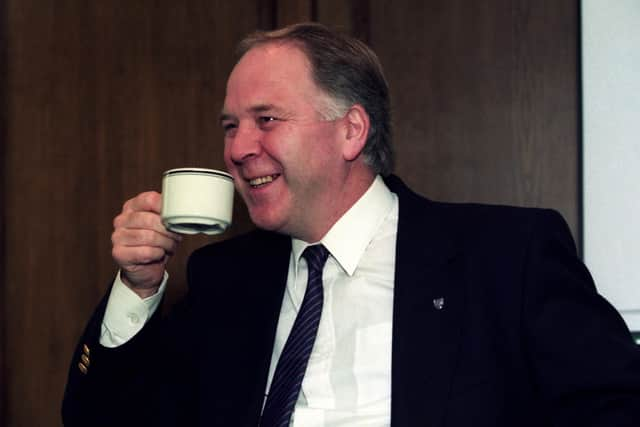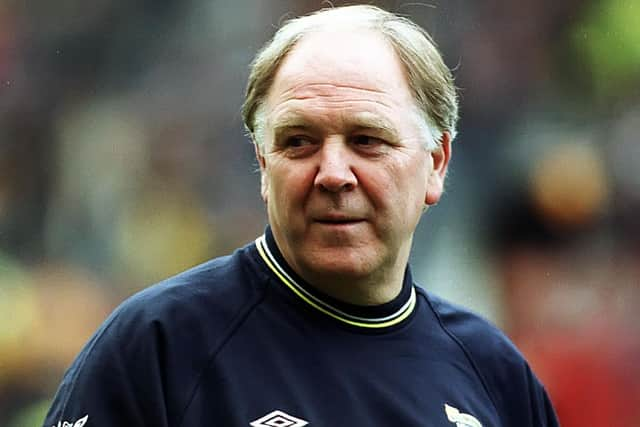Craig Brown was much more than the last man to take Scotland to a World Cup: dignity could have been his middle name
Craig Brown was about so much more than just this. ‘Just this’. Taking a football-obsessed country to a World Cup is something many of us would wish could define our lives. Only eight men have managed Scotland at this rarefied stage. We now mourn the most recent gentleman to have done so.
Make no mistake, Brown, who has died at the age of 82, was the gentleman’s gentleman. Might he have been the humblest man to succeed in football? Very possibly. But he knew defeat and failure had to be borne too. Handling these occasions so magnanimously is where he set himself apart from today's whining narcissists. Abusing referees in underground car parks certainly wasn't his style.
Advertisement
Hide AdAdvertisement
Hide AdHighlights of Scotland and England’s Euro 2000 play-off battles in 1999 isn’t the place one might imagine heading on hearing the sad, if not completely unexpected, news about Brown’s passing.


The rivals were locking horns for the first time since Euro '96 and emotions were again running high. Scotland lost the first game 2-0 at Hampden, just one of nine - yes, only nine - competitive defeats suffered by Brown in 70 matches in charge of the national team.
Brown afterwards congratulated England and Paul Scholes, who scored two fine goals. But he noted it would be a different story at Wembley.
It was. Scotland won 1-0 thanks to a Don Hutchison header from a cross from Neil McCann, who Brown had drafted into the side after Kevin Keegan took the unusual step of announcing his team in advance. The winger was picked in the knowledge Sol Campbell was playing right back for England. Brown knew Campbell would struggle with McCann's speed and trickery.
Only a wonder save from David Seaman, who had saved Gary McAllister’s penalty in the Euro 96 group fixture, prevented Christian Dailly taking the tie to extra time. It was a bravura performance but the disappointment at the end was profound. Brown, nevertheless, embraced Keegan, as he had done so at Hampden a few days earlier.


“They gave us a bit of a pummelling,” admitted Keegan later. “They came here with nothing to lose. And to be fair to Craig Brown, some of the stuff written this week would make you think he can’t do his job. But he is a terrific manager, he’s got a great record and he’s taken my unbeaten record away from me, at Wembley of all places. But I will live with that."
Keegan might well go further than this now. He might say he is happy about it, that the record could not have been broken by a nicer man. Keegan and Brown were from the same breed. Football men, I suppose you might call them. In the case of Brown, certainly, he was a people person. He might dispute what a sports journalist had written or said about him - and as Keegan alluded to, the criticism could be severe - but he would never sneer at them.
All that he would ask for in return was some equivalent respect, something this writer unforgivably denied him while writing a snivelling piece reviewing Brown’s efforts on a radio show he and his brother Jock briefly hosted in the early 2000s. He rightly phoned up suggesting it might have been a little OTT. Shame still shudders through my body at the recollection.
Advertisement
Hide AdAdvertisement
Hide AdAnother memory is post-match against Latvia in 2001, when he had announced he was leaving the post of Scotland manager. Someone suggested another “Largs mafia” appointment would not be popular.
“Largs coaching is Alex Ferguson, Jim McLean, Gordon Strachan, Tommy Burns and Walter Smith," Brown replied. "That's the Largs mafia. It's the biggest compliment that I am ever paid if they call me the 'Largs mafia', because the head of the Largs mafia is Sir Alex Ferguson.”
Still, the idea that Brown, among the most clubbable, friendly people within sport, would willingly subscribe to a mafia is preposterous. Elitism was not his game.
During phone calls, he would recite the names of the classic Dundee side of the early 1960s: Liney, Hamilton, Cox, Seith, Ure, Wishart, Smith, Penman, Cousin, Gilzean and Robertson.
Doing this isn’t necessarily worth noting other than it served to highlight squad member Brown’s own absence from the starting line-up, and yet he would reel off the names with as much rhythmical relish as any Dundee supporter.
If anything, he underplayed his involvement. “If anyone got hurt, Brown got a game,” he once recalled. In actual fact he played as many as nine games when Dundee won the Scottish title in 1961-62, mostly deputising for the injured skipper Bobby Cox.
But stand-in was as good as it got for him at Dundee, due mainly to an injury sustained at Rangers, his first club. Nevertheless, he agreed to write a foreword to Jim Hendry's book, Dundee Greats, where he noted he had been the first brought to the club by Bob Shankly, and the last to be transferred out (to Falkirk) during the legendary manager's reign. It certainly gave him a unique insight into the most illustrious chapter in the club's history.
The first time I met him was at the launch of that book at Dens Park in 1991. He treated someone who was just a student at the time to the same attention as the footballing greats dotted around the room.
Advertisement
Hide AdAdvertisement
Hide AdThe last time I spent significant time in his company was at a lunch five years ago in Edinburgh after he answered an invitation from sports journalist and Dundee fan Patrick Barclay. Along with former teammates Ian Ure and Bobby Wishart, Brown, then a director at Aberdeen, agreed to commit some memories to film of the championship season at Dens and subsequent run to the European Cup semi-finals.
He drove all the way from Aberdeen to Edinburgh and back on the day of a club board meeting just because he wanted to do justice to a great team, of which he was only a fringe member – and refused even to take any petrol money for his troubles.
Travel on well James Craig Brown. Craig was, in fact, his middle name. It could easily have been Dignity.
Comments
Want to join the conversation? Please or to comment on this article.